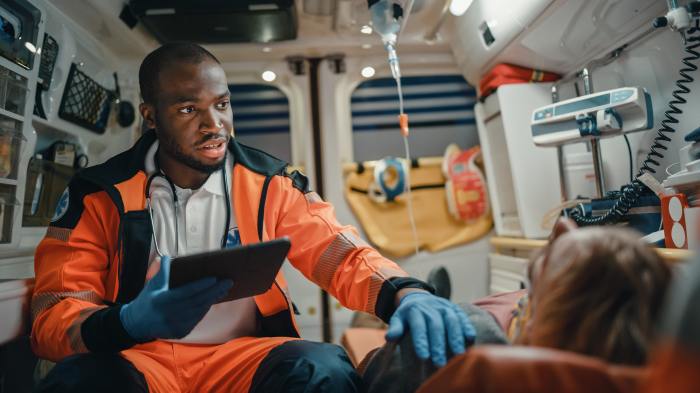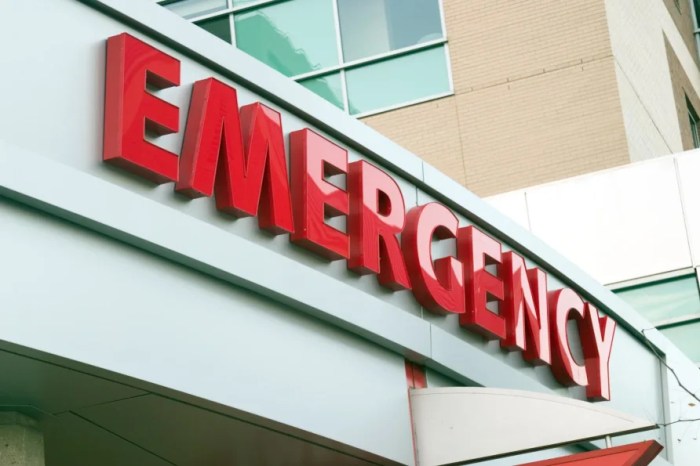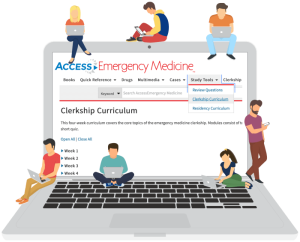
Diving into the realm of Mental Health Emergency Care, this introduction aims to provide a comprehensive overview of the critical aspects involved in handling mental health crises effectively. From the importance of early intervention to crisis de-escalation techniques, this topic delves into the essential strategies and procedures that healthcare professionals employ in emergency care settings.
Exploring the various types of mental health emergencies, the challenges faced, and the collaborative approach required, this narrative sets the stage for a deeper understanding of Mental Health Emergency Care.
Overview of Mental Health Emergency Care
Mental health emergency care is a critical aspect of healthcare that focuses on providing immediate and specialized support to individuals facing mental health crises. These crises can include severe depression, suicidal thoughts, psychosis, or other acute mental health conditions that require urgent intervention.
Key Components of Mental Health Emergency Care Services
- 24/7 Crisis Hotlines: Accessible phone lines that individuals can call for immediate support and guidance during a mental health emergency.
- Mobile Crisis Teams: Teams of mental health professionals that can be dispatched to provide on-site assessments and interventions in emergency situations.
- Emergency Room Psychiatric Services: Specialized psychiatric care within hospital emergency departments to address acute mental health crises.
- Crisis Stabilization Units: Short-term residential facilities that offer intensive support and monitoring for individuals experiencing mental health emergencies.
Challenges in Providing Emergency Care for Mental Health Crises
One of the main challenges in mental health emergency care is the stigma associated with mental illness, which can prevent individuals from seeking help or receiving appropriate care in a timely manner. Additionally, there may be limited resources and funding allocated to mental health services, leading to gaps in access to emergency care. Coordinating care between different providers and ensuring continuity of care post-emergency intervention can also be challenging in the complex landscape of mental healthcare.
Importance of Early Intervention
Early intervention plays a crucial role in addressing mental health emergencies effectively. By providing timely care, individuals experiencing a crisis can receive the support they need to prevent the situation from escalating further.
Impact of Timely Care
- Reduced risk of self-harm or suicide: Prompt intervention can help individuals at risk of self-harm or suicide to receive necessary treatment and support, potentially saving lives.
- Prevention of long-term consequences: Early intervention can prevent the development of more severe mental health conditions or complications that may arise if left untreated.
- Improved recovery outcomes: Timely care can lead to faster recovery and better overall outcomes for individuals experiencing a mental health crisis.
Promoting Early Intervention
- Increasing awareness: Educating the public about the signs and symptoms of mental health emergencies can help individuals identify when they or someone else may need help.
- Access to resources: Ensuring that mental health services and resources are readily available and easily accessible can encourage individuals to seek help early on.
- Destigmatizing mental health: By reducing the stigma surrounding mental health issues, more individuals may feel comfortable seeking help when experiencing a crisis without fear of judgment or discrimination.
Types of Mental Health Emergencies
When it comes to mental health emergencies, there are several types that require immediate care. It is crucial for healthcare professionals to be able to identify these emergencies and handle them appropriately to ensure the safety and well-being of the individual in crisis.
Suicidal Behavior
Suicidal behavior is a serious mental health emergency that requires immediate attention. Healthcare professionals should take any mention or indication of suicidal thoughts or intentions seriously. It is important to provide a safe environment, remove any means of self-harm, and connect the individual with appropriate mental health resources.
Psychotic Episodes
Psychotic episodes involve a loss of touch with reality and can be frightening for the individual experiencing them. Healthcare professionals should approach these situations with calmness and empathy. It is important to ensure the safety of the individual and others, provide reassurance, and seek immediate psychiatric evaluation.
Acute Anxiety or Panic Attacks
Acute anxiety or panic attacks can be overwhelming and debilitating. Healthcare professionals should help the individual practice grounding techniques, such as deep breathing or mindfulness, to help manage symptoms. It is important to remain calm, provide a supportive environment, and consider medication or therapy options.
Aggressive or Violent Behavior
Aggressive or violent behavior can pose a threat to the safety of the individual and those around them. Healthcare professionals should prioritize safety measures, such as de-escalation techniques and physical restraint if necessary. It is important to address the underlying causes of the behavior and provide appropriate interventions.
Substance-Induced Mental Health Crises
Substance-induced mental health crises can result from the use of drugs or alcohol. Healthcare professionals should assess the individual for intoxication or withdrawal symptoms and provide medical intervention if needed. It is important to address substance use issues and connect the individual with addiction treatment resources.
Emergency Care Procedures
In mental health emergency care settings, standard procedures are followed to ensure the safety and well-being of individuals experiencing a crisis. This involves conducting thorough assessments to determine the severity of the situation and implementing protocols to manage challenging behaviors effectively.
Assessment Process
Assessments in mental health emergencies are crucial in determining the severity of the crisis and the appropriate course of action. Healthcare providers typically conduct thorough evaluations to gather information about the individual’s symptoms, behavior, and any potential risk factors. This information helps in formulating an accurate diagnosis and developing a personalized treatment plan.
Managing Challenging Behaviors
When dealing with individuals in mental health crises, healthcare providers must be prepared to address challenging behaviors effectively. This includes de-escalation techniques, communication strategies, and the use of medications when necessary. Protocols are in place to ensure the safety of both the individual in crisis and the healthcare team.
Ensuring Patient Safety
Patient safety is paramount in mental health emergency care. Healthcare providers must create a safe environment for individuals in crisis by removing any potential hazards, providing constant supervision, and implementing interventions to prevent harm. Collaborative efforts among healthcare professionals are essential to ensure a coordinated and effective response to mental health emergencies.
Crisis De-escalation Techniques

In mental health emergency care, crisis de-escalation techniques are crucial in managing situations where individuals are experiencing heightened distress or agitation. These techniques aim to calm the individual, reduce the risk of harm to themselves or others, and create a safe environment for all involved. Effective communication and empathetic listening play a significant role in successfully de-escalating crisis situations.
Importance of Effective Communication
Effective communication is key in de-escalating crisis situations. It involves maintaining a calm and non-threatening demeanor, using clear and simple language, and actively listening to the individual’s concerns. By demonstrating understanding and empathy, healthcare providers can establish rapport and trust, which are essential in diffusing tense situations.
- Use a calm and reassuring tone of voice to convey a sense of safety and support.
- Acknowledge the individual’s feelings and validate their emotions to show empathy.
- Avoid using threatening language or making demands that could escalate the situation further.
De-escalation Strategies
Various de-escalation strategies can be employed to help calm individuals in distress. These strategies focus on reducing stimuli, promoting relaxation, and providing reassurance to the individual.
- Creating a safe physical environment by removing any potential triggers or hazards.
- Encouraging deep breathing exercises or other relaxation techniques to promote a sense of calm.
- Offering reassurance and support by staying with the individual and providing comfort as needed.
Collaborative Approach in Emergency Care

In mental health emergency care, a collaborative approach involving healthcare providers, social workers, and law enforcement plays a crucial role in ensuring the best possible outcomes for individuals in crisis.
Significance of Multidisciplinary Approach
A multidisciplinary approach brings together professionals from different backgrounds with diverse expertise to address the complex needs of individuals experiencing mental health emergencies. By combining medical knowledge, social support, and legal considerations, this approach ensures a comprehensive and holistic response to crisis situations.
Benefits of Collaboration
- Improved Coordination: Collaboration between healthcare providers, social workers, and law enforcement agencies enhances communication and coordination, leading to more efficient and effective interventions.
- Enhanced Safety: Working together allows professionals to assess risks, implement appropriate safety measures, and ensure the well-being of both the individual in crisis and those involved in the response.
- Comprehensive Care: By pooling resources and expertise, collaborative teams can provide a range of services, including medical treatment, counseling, social support, and legal assistance, tailored to the unique needs of each individual.
Successful Collaborative Interventions
One example of a successful collaborative intervention is the Crisis Intervention Team (CIT) program, which trains law enforcement officers to respond to mental health crises effectively. By working closely with mental health professionals and community organizations, CIT programs have been shown to reduce the use of force, decrease hospitalizations, and connect individuals to appropriate care and support services.
In wrapping up the discussion on Mental Health Emergency Care, it is evident that timely intervention, effective communication, and a multidisciplinary approach play pivotal roles in ensuring positive outcomes for individuals experiencing mental health crises. By understanding the nuances of emergency care procedures and crisis de-escalation techniques, healthcare providers can navigate challenging situations with empathy and expertise.
FAQ Overview
What are some common warning signs of a mental health emergency?
Common warning signs include extreme mood swings, thoughts of harming oneself or others, severe anxiety or panic attacks, and disorganized thinking.
How can healthcare providers ensure patient safety during a mental health crisis?
Healthcare providers can ensure patient safety by maintaining a calm and reassuring presence, establishing clear communication, and following established protocols for crisis management.
What role does effective communication play in crisis de-escalation?
Effective communication is crucial in de-escalating crises as it helps establish trust, understanding, and empathy between the healthcare provider and the individual in distress.






